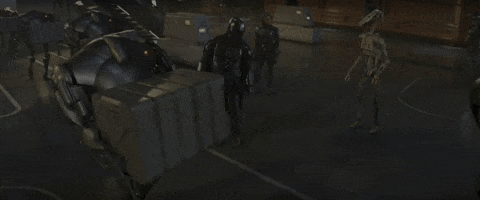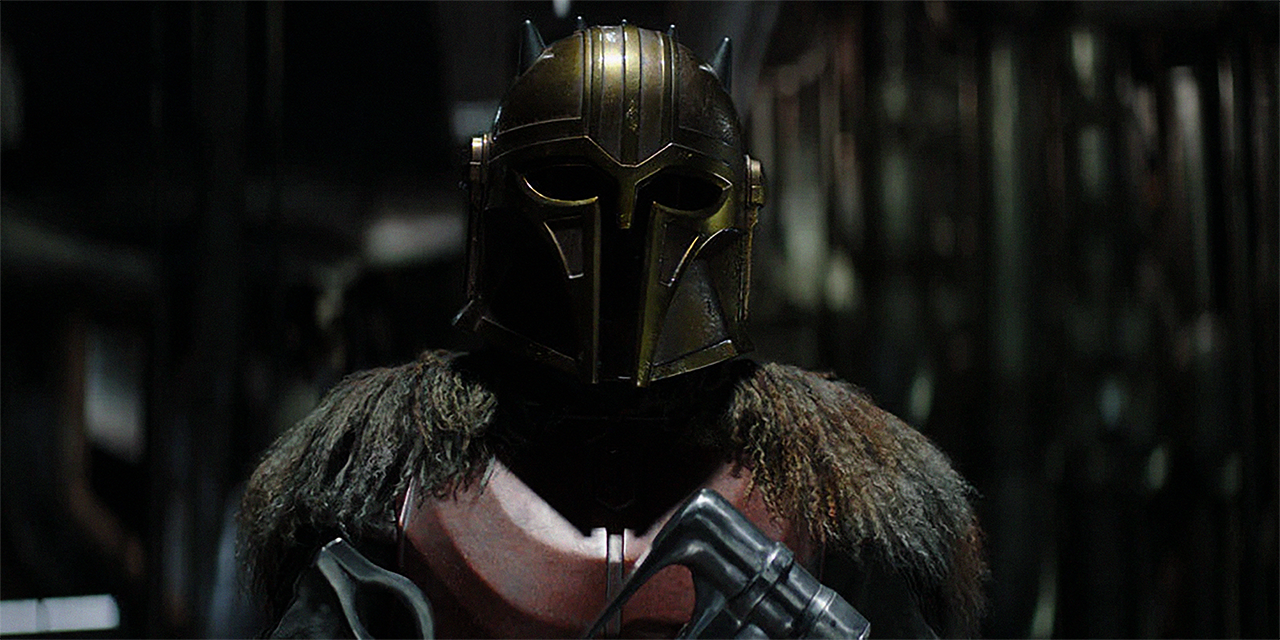Yes, Din Djarin is backsliding. No, it's not bizarre or inexplicable. Rather, it's an intentional externalization of inner conflict.
Mando hates droids. He begins to soften on that throughout season one of The Mandalorian, thanks to his NannyBot best friend IG-11. But it's worth remembering where that enmity comes from: battle droids killed his parents. Yet it's because of those battle droids that he became a Mandalorian. Let that sit for a moment, we’ll circle back.
Din is at a crossroads: Something’s off. He cannot see it yet, but he can feel it. He's reached the apotheosis of his Hero's Journey and returned with the magic elixir. No, no. Not the living waters.
Grogu. The "boon" of his quest is being with his son. This is where the Hero's Journey usually ends. But something isn't right. In The Heroine's Journey, Maureen Murdock describes the next stage as a sort of depression. A period of "spiritual aridity."
A woman who gives her life over to the control of the unrelated masculine within becomes driven by the need to measure up and achieve according to male-defined standards. At some point she will come to realize that to survive and to live a healthy, satisfying life, she will have to make some changes. The assumptions she made about the rewards of the heroic journey have been wrong.
Turns out, the life Din Djarin thought he wanted might not be enough anymore.
But Din is a mando few words. The most we ever hear him speak is when he's being a teacher and father to Grogu. We see early examples of this in episodes like Chapter 12, when he's trying to coach the little guy through repairing those wires in the Razorcrest. Remember that?
Of course, an actor of Pedro Pascal's skill doesn't need dialogue. He could show all of this with just his eyes if he had to (see HBO’s The Last of Us). But that’s the problem… How do you communicate the inner conflict of a character who rarely speaks and never shows his face?
Have you ever ended a bad relationship only to tumble back into it again? Din Djarin is adrift, and straining to reach the only shore he knows. He's so desperate for solid ground that he gives up all the progress he's made separating himself from the Children of the Watch in the vain hope that everything will be like it was, for him and Grogu.
I hear complaints Mando is too passive, that he's reseeding from his own show. And yes, those things are happening. Deliberately. Din is CHOOSING to diminish. Out of fear, yes, but not of death. Not for him or Grogu. He’s afraid of that other undiscovered country: the future.
Din Djarin has no idea what he's supposed to do, who he's supposed to be, without The Way of the Mandalore. He's discovered there are other ‘ways’ to live as a Mandalorian, and his perfect willingness to accept those strictures has begun to atrophy. There's no coming back from that realization.
But how do your reveal these feelings to the audience short of resorting to an out-of-character monologue? Through action and behavior? Sure, why not? A little Mando tantrum? A tantrumando.
That could be fun.
First, let's lay the idea out using battle droids as an example:
Din hates droids.
Droids killed his parents.
Droids are the reason he became a Mandalorian…
which is what made him who he is…
someone who takes his helmet off for his son.
Which makes him "a Mandalorian no more."
Behold: the seeds of resentment. Remember that old anti-drug commercial?
I need to work longer, so I can make more money, so I can do more coke. So I can work longer, so I can make more money, so I can…
In psychology they have this concept called transference. That's the thing where you redirect your anger to a safe target. A therapist, ideally. Some folks use a friend, or a punching bag. Or droids.
So, my question to you is this: Is Din REALLY regressing in his attitude toward droids, or is he shoveling his (justified) resentment onto a subconsciously perceived safe target?
"You can't reason with a droid," Din says. Is he talking about droids here? Or is there some other unreasonable presence in his life? Say… a hardline mother figure who does not bend...
Until she does.
For Bo-Katan.
Paz Visla expresses for us what Mando is Feeling in that moment: "But SHE removes her helmet!!"
Din Djarin is a child experiencing the real galaxy for the first time. He’s been out there for years, sure, but he’s never been participatory; never felt like it was a place where he could exist. And, wiser now, he is realizing how small his old world was, and how frustrating it is to be confined to the arbitrary rules that used to give him comfort.
Yet he does not have the tools to express this in a healthy way.
So he's acting out. Kicking droids around like a roboticist from Boston Dynamics, threatening them, pushing his anger and frustration onto this almost literal representation of the Armorer: a suit of metal encasing a set of rules.
He's never seen her face. His mother's face. And he deliberately chose not be the same kind of faceless figure for Grogu.
I am loving this. We so rarely get Mother/Son conflict in Star Wars; it's my second favorite family dynamic! And as much as we'd like the Armorer to be a villain, life isn't that easy. She's a believer, yes, and an antagonist. But she's a person too.
Reactive Attachment Disorder (RAD) is a psychological condition where a child has not formed a healthy bond with their guardians. Either through abuse or neglect, the tools to process complex emotions have not been given to them.
Children may be more likely to develop RAD if they:
✔Have many different parent figures, like multiple foster care situations.
✔Were taken away from their primary caretakers after bonding with them emotionally.
✔Experienced several traumatic losses early in life.
✔Have parental figures who didn’t try to become emotionally close to them.
✔Spent time in an institution, like an orphanage, where they didn’t have a loving parent figure.1
Din's situation is analogous to a foster child stuck in an system that dishes out severe consequences for those who do not conform. It can dull their emotional intelligence, which manifests in adults as apparent standoffishness; an unwillingness to engage.
Slowly, Grogu broke down that emotional resistance in Din, which culminated in their beautiful goodbye (and Mando’s fateful choice to remove his helmet) at the end of season two. In the subsequent interval, Din descended into the underworld of his old life, alone, and finally understood it wasn't what he wanted anymore; that Grogu had changed him on a fundamental level.
It's not accidental that as Mando regresses, Grogu fades into his periphery. We still get cute scenes with him, but Din's own interactions with his son have stagnated. To fit both himself and Grogu into his old vase, he must trim the parts that have begun to grow and blossom.
No one sews a piece of unshrunk cloth on an old cloak, for the patch pulls away and a worse tear is made. Neither is new wine put into old wineskins; otherwise, the skins burst, the wine is spilled, and the skins are ruined. New wine is put into fresh wineskins, and so both are preserved.2
It's beautiful work; unsubtle but thoughtful. A brilliant culmination of this season's early foreshadowing with IG-11. That old programming is always lurking beneath the surface, like an ancient dinosaur at the bottom of an underground lake.
Matthew 9:16-17








